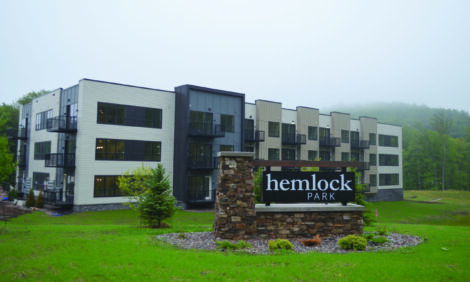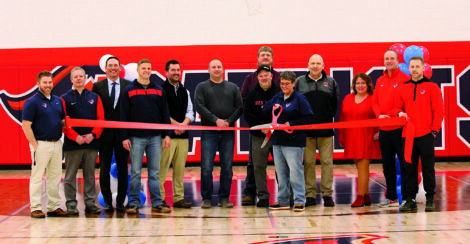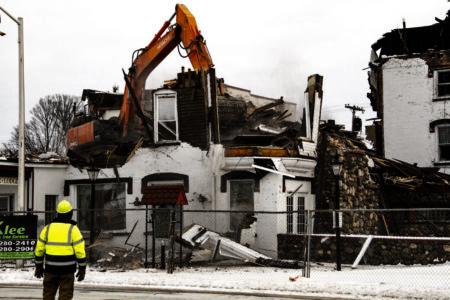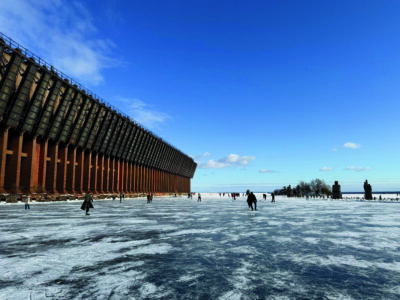Mahaney addresses Detroit News article in Q&A session
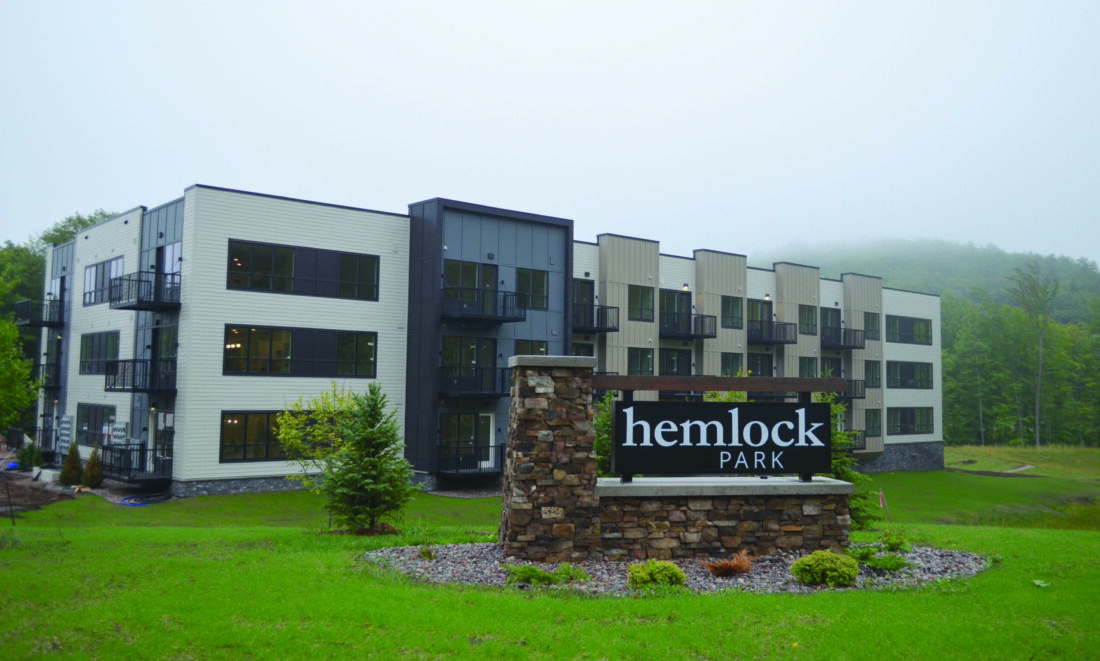
The Freewheel Apartments at Hemlock Park, a new 39-unit “upscale” apartment complex on the outskirts of Marquette. (Journal file photo)
EDITOR’S NOTE: The following is the result of an interview conducted with Bob Mahaney, CEO of Veridea Group, on Oct. 15 in response to a Detroit News article that ran in The Mining Journal on Aug. 28.
- The Freewheel Apartments at Hemlock Park, a new 39-unit “upscale” apartment complex on the outskirts of Marquette. (Journal file photo)
- MAHANEY
Explain your relationship with Build U.P. and InvestUP
Mahaney: I was one of the co-founders of InvestUP back around 2017. I served as its first Board Chair, the first five years, roughly. I might be off by a few, I don’t know the exact dates. We are members of InvestUP and like all, roughly, 35 other members, every member is also a member of the Board of Directors. So we’re a member and by virtue of our membership, we’re also on the board. We’re not active in the day-to-day dealings of InvestUP at all. 10 board meetings, just like all their 35 members. Build U.P., we have no formal connection to at all. The only connection that one could say is by virtue of being a member of Invest and Build U.P. is an entity that is under the Invest umbrella, that I guess there’s some connection there. But, Build U.P. has, I think you folks know, has its own separate board and its own separate operating team, let’s call it, that underwrites — to use finance jargon — underwrites their loan program.
Explain what state law says about the use of state money to build houses of varying types
Mahaney: I don’t know if there’s anyone in the state that could answer that question. No, I should say it this way. There’s no, that I’m aware of, there’s no definitive state guidelines for, you know, ‘this is this type of housing’, and I think you’re referring to income levels relative to rents or home prices. There’s different metrics that are being used from what we see, whether it’s MSHDA, whether it’s another, say the legislature comes out with a program — which is what Build U.P. is. That came directly from the legislative side. Then you’ve got the federal programs, right, which is, they’ve got their own set of measures.
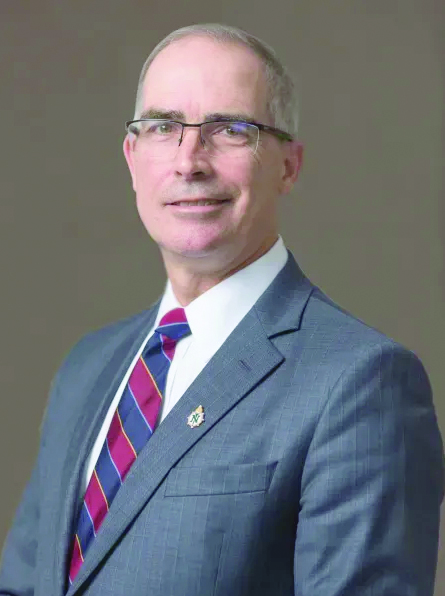
MAHANEY
What are the monthly rent numbers for the Hemlock Park Project?
Mahaney: I have that information. I’d like to answer that by just focusing on average rents because there’s a number of different units in there. Our average rent at Freewheel, the apartment building that Mr. Mauger (of The Detroit News) focused on, is $2,499 a month. Context, and I’d be happy to get you this, this comes from MSHDA. His argument was that, or the point he was trying to make, was he was trying to use MSHDA as the baseline, right? And the way this works is typically, you look at income levels by county, and then you extrapolate from that a percentage of where someone’s income falls within the average median income. So, basically, the threshold you look at is 120 percent of average median income for Marquette County. Then you have to factor in how many, either how many people are renting or how many bedrooms. Okay, so you’ve got to make some assumptions. So when we make, the typical benchmark that you would use is like a two-to-three person, and in ours, we’ve got two bedroom plus, what we call one bedroom plus. We have two and three bedroom units, essentially, effectively. So, if you across and you look at 120% of AMI annual median income, $2,355. We’re at $2,499, so we are 6% above the MSHDA benchmark.
How did the money for the project come to be?
Mahaney: Well, 90% of the money, we funded through our resources, and then 10% is through the Build U.P. program.
Are you still on the board with InvestUP?
Mahaney: Yes.
Why was Build U.P. established?
Mahaney: Great question, glad you’re asking, because we have an acute housing shortage — not just in Marquette city or Marquette County, but across the entire U.P. In fact, are you familiar with the housing study that was done? It was led by LSCP, I think LSCP in the city and others paid for. It was done by Land Use. This study alone talks about that. First of all, the housing mismatch in Marquette. Supply (and) demand. We have plenty of single family homes, but what we need are condos, townhouses and apartments. That’s one takeaway. It says, for example, that we need 470 new for-sale housing units per year over the next five years, just to get to equilibrium, let’s call it. If you go in and do a dive into this, the study says, just for the city of Marquette over the next five years, we need 750 new for-sale housing units. On a gross level, including students, we need 680 rental units per year. Take students out, it’s 280 units per year times five years. So you put those two together, 150 for-sale units is 750. 280 rental units over five years, that’s 1,400. You add those two together, you’re at 2,150 units. So, why was Build U.P. created? There’s a housing shortage, but then, why is there a housing shortage? This is my opinion. There’s a number of factors, but it all comes down to costs have gone way up. But there’s another burden that’s placed on developers in the state of Michigan, at least in the U.P., historically. That is, you ask a developer to pay for out of their pocket to build assets for which they will not, not only will they not receive any revenue from, they will not even own them, and that is streets … it’s public infrastructure. So in a lot of states and communities, programs have been developed that address that. Right now, for example, at Hemlock, we have 26 single family housing units there. The public infrastructure component, the actual cost, is roughly $100,000 per lot. So, you see, you layer on top of that, the cost of construction today — which has gone way up — the U.P. is a very expensive place to build. We have limited labor, we have high delivery costs, supply chain affects us as much as anywhere in the country in a negative way. Now we’ve got the tariff mess to deal with as well. You got all these headwinds. So, Build U.P., by virtue of creating a program whereby you can get funding for the public infrastructure component, is crucial. That’s why it’s been able to, if you think about it, in just, what? 18 months or so that it’s been in existence? I think it’s up to 218 housing units with 11 separate developers. Across the U.P., they have been able to deliver. If you look back at housing starts in the U.P. and study that data, it’s having a very significant impact in a positive way. And if I may opine, I think that’s really the story here. The story is a really good news story. Build U.P. came out of, actually out of our experience and other developers’ experience in realizing that the public infrastructure component is kind of an insurmountable headwind at the end of the day when you layer in all the other things. It’s virtually impossible to bring to market a competitively-priced housing unit. So we can’t change tariffs, we can’t change inflation, we can’t change interest rates. What can we change? What can we affect? And it’s that public infrastructure funding, and that’s what Build U.P. does.
The Hemlock houses — what do these cost on average?
Mahaney: Our lower price units are in the mid-to-upper $400,000s. Our premium units are in the upper $500,000s.
Do you know approximately how many square feet the housing units are, on average?
Mahaney: They range from 1,200 to 1,700, up to 1,800, 1,900. There’s three different styles right now.
What contractors were used to build these units?
Mahaney: Well, GE Builders out in Negaunee are building the single family homes. I’m trying to remember who they’re using for subs. Karki’s for drywall, a lot of local subs for that. The apartments, that was built by Midwest Builders. They have offices in Holland and here in Marquette. Prime did the mechanical, Karki did the drywall, I can’t remember who did the framing. Oberstar has done all the earth work out there and all the public water, sewer, streets.
In this process, did The Detroit News contact you by phone for an interview?
Mahaney: (They) emailed me. He initially called some of our staff members, who are not the people to call as a reporter, trying to catch them off guard, calling them kind of out of the blue, no introduction, and we have a policy that staff doesn’t talk to media. We welcome media, and I told them this, we welcome media requests. We’ll talk to the media. But, we have certain guidelines, and he tried to circumvent those guidelines. He finally did come to me, and I said, ‘I welcome your inquiries. Submit your questions in writing.’
Have you made contact with them since the article was published?
Mahaney: No.
Is there anything else you’d like to add for the sake of clarity?
Mahaney: When a story like this comes out, first of all, it’s easy to focus on the big, bad developer. We’re used to that. We’re used to criticism. I welcome criticism. The work we do is very public, and the process for getting zoning, brownfield, whatever approvals we need, is a public process with public input. We welcome that, and actually, out of that process, we’ve gotten some pretty good ideas. In fact, we just went through the process on the townhomes that we’re going to build up at Marquette General. We had a number of public meetings, both in a formal and informal setting, and we got some great feedback out of that that we incorporated in the plan. So we’re not opposed to sharing our plans and whatnot with the public and taking their input. Where the line gets crossed is when our integrity is attacked, and let me explain why that matters so much. If you think about it, our business relies on two very essential components. Number one is the public trust. Build U.P. is state money, and we have an obligation to use it according to the guidelines that were established by the legislature and in turn, is directed to InvestUP. We followed every one of those guidelines. We never asked for favorable treatment. We never had any conversations with board members, with the decision makers at Build U.P. Going back now to the public trust, when an article like The Detroit News is published, and it basically says that we are unethical, and if you look at it, also it suggests that we’ve engaged in criminal behavior. Twenty-five times our name is mentioned in that article. This article created by Mr. Mauger, that basically is disparaging us in the worst ways, creating public distrust. Since that article has come out, we’ve had a number of public meetings, ironically, a pretty large number of meetings pertaining to the redevelopment of the MGH campus. In every one of those meetings, this article has come up and the charges in this article, and people accusing us of being unethical and potentially criminal based on one article by a guy 400 miles away who never did his homework. Basically, we were used as pawns, InvestUP was used as pawns, Build U.P. was used as pawns to advance his agenda. He’s got a vendetta against the MEDC. He’s done a number of investigative stories on the MEDC, and he’s decided to go after this. Why? I don’t know. You’d have to ask him. But at the end of the day, we gave him the facts and he chose to ignore the facts, or to use them in a very specious manner to advance his agenda, which is basically to try to disparage the MEDC and by extension anybody that was involved in this program that the MEDC administers. MEDC didn’t even create this program. So, there’s the public trust element. We’ve been damaged greatly by this article. We’ve had to spend our time proving our innocence. There’s nothing on the public record out there that responds to this article. Now here’s the other part where this damages us, and in turn, I would submit it damages, it’s not good for the city of Marquette, either. We’re embarking on the largest private development in the history of the U.P., that’s the redevelopment of the Marquette General property. That’s going to be probably a 200 to 250 million dollar total project. It’s going to create probably 400 to 500 jobs. It’s going to create 350 to 400-plus housing units when all is said and done. It’s going to take time, but that’s the end goal, that’s the vision, that’s the plan. In order to secure the funding for that, the capital, we have to go outside the U.P., OK? We have great relationships with the banks and other capital providers that are here in the U.P., that know the U.P. and that know us that we have longstanding relationships with. But this project is of a size and scope where we have to go outside the U.P. and we have to build new relationships. And, as things stand right now, the first thing those people are going to do, after we have our introductory phone call or whatever, they’re going to Google us, right? They’re going to start doing their background checking. And what do they see out there right now? They see an article from The Detroit News that basically suggests we’re crooks. Who would do business with us? Ironically, we had one of the largest banks in this country, in the world, here in Marquette for the first time, probably in the history of that investment bank, meeting with us to discuss this project on the day that story came out. You see where I’m going? So there’s real damage, not just to us, but by extension to the community, because we have an obligation. It’s for the best interests of the community to get the old MGH site developed as quickly and as well as possible, and this has had a real impact on our ability to do that.

